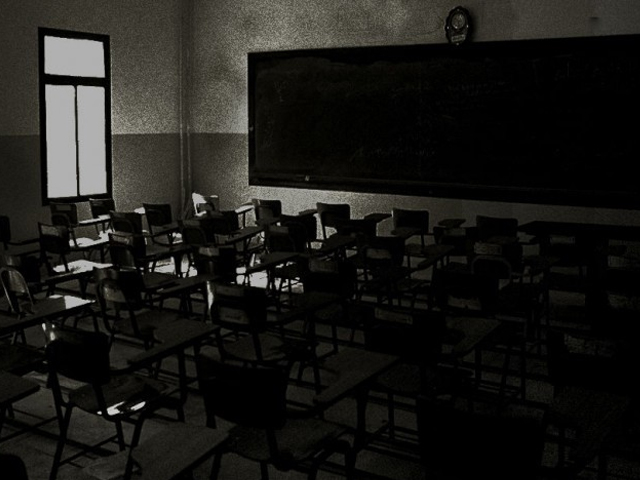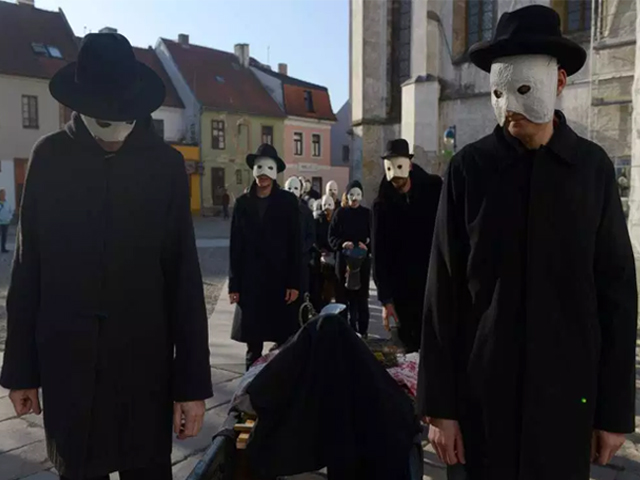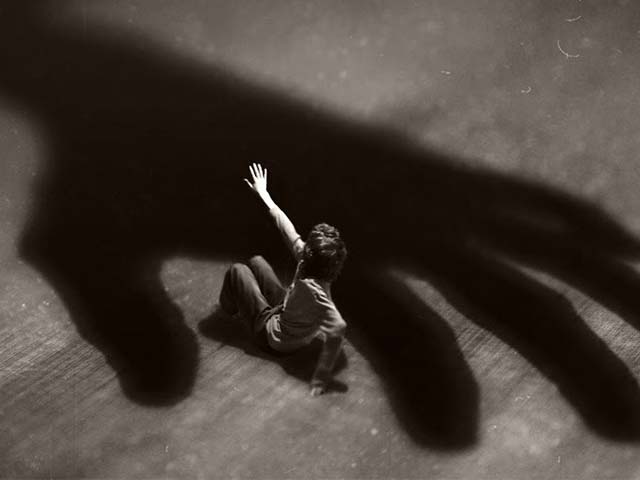
Familiar handcuffs
He felt punished. Not for the present, but, maybe, for the past.
He could hardly hear him – his words did not even brush his shoulders as they hurried past. His eyes were feeling extremely heavy, not because of sleep or weariness, but because of its on-going conversation with another’s gaze.
He was at the bus stop. As his friend sat across, speaking without realising how little was being absorbed, a stranger, who stood silently in the corner, stared directly at him, perhaps even within him. The owner of the gaze appeared to be an old woman, and she wore a long overcoat, but it wasn’t long or big enough to hide other pieces of clothing which showed their faces here and there from underneath.
Somehow her gaze made him feel a very strange familiar feeling; a feeling that he had somehow forgotten. But he felt now with the same intensity with which he once used to; he felt punished. Not for the present, but maybe for the past? And that vague recall of a past error made his eyes moist and he averted his gaze.
Who was she, anyway? And when did a stranger’s gaze so easily penetrate one’s past? The bus was about to arrive, he thought.
He was still trying hard to avoid looking in the stranger’s direction. But after a while, he had to look, and when he did, he still found her eyes resting at the same place as they were before. He saw the edges of her eyes were filled to the brim with anger. And the anger was very personal. Here, this woman, who he had never met before, stood devastated, and he knew he was the reason.
His friend, finally noticing the pile of his own words in the air, whispered,
‘Why are you staring at her? I’m sure she’s drunk.’
They saw the bus approaching, and he told his friend to take it.
‘Are you mad? It’s the last bus. Don’t be an idiot.’
‘I need stay back here,’ he said, and these words were uttered with such seriousness that each word stood on its own, away from the support of the previous or next word.
His friend looked at him surprised, never having heard this tone or these words before. If this situation had been narrated to him any time before, he would never have caught the last bus and leave his friend with a total stranger. But in our thoughts, our actions are as different as the gap that exists between thoughts and reality.
As the last sound of the bus died peacefully in oblivion, a silence came to sit on the bench, taking his friend’s place. No words roamed the air anymore. There was no air, either.
Now, his eyes indicated that the stranger had finally averted her stare and she now gazed at something directly ahead. He sat there, and waited for the reason he had stayed. After a moment, she came towards the bench and lifting silence politely by its shoulders, sat down in its place, and said,
‘What’s the thing about people that is the best and worst?’
‘They leave you when you least expect them,’ he automatically answered, and as his words left his mouth, he looked at them with surprise, unaware that he had possessed them.
‘Is there anything else whose absence hurts as much?’
‘Yes’
‘Who left you?’
‘My own dignity.’
She nodded and finally her facial features relaxed as ours do when we hear someone pronounce the truth and hold it up high in the air so that lies can finally stop their act of pretence, pack their bags, and audition elsewhere,
‘What is dignity, anyway?’
‘The respect that you have for yourself?’
‘Do you lose it often?’
He smiled for the first time that night,
‘I lose it daily. And I am constantly reminded of this loss. I hate standing in front of mirrors of any kind, be it someone’s eyes, a passing car’s window, an honest statement, a close friend and my own thoughts. I see a reflection of myself in each of these and I’m repelled by the sight I see, by the reality that I have become.’
She sighed, and the air carried her sigh here and there and there and here, playing with its softness, exploring its quiet grief, and touching its centre of soft empathy, before taking it inside of itself.
‘What is it that repels you about yourself?’
‘My past. Why should I be handcuffed to it every day?’
‘Isn’t everyone? If they don’t cry out in public, it doesn’t mean they don’t resist it in private.’
‘But I want to have nothing to do with it. I want it to be separated, thrown away, peeled off in a way that even my nails forget.’
‘The past is a part of you, how can you separate from your own self?’
‘What do you mean?’
‘The memories that you have gathered, the people you have hurt, the grief that you have received with open arms, the laughter that you have induced, the sights you have stored in different rooms, the regret that you have drank so often, the tears that you have tasted as they made their way down an oft-travelled surface, and the love that you have searched for, it’s all an inseparable bundle which will always go with you.’
‘But it’s so heavy. The weight of it has compressed my entire being.’
‘What if it has been the other way around and it has been you attempting to compress yourself?’
‘Are you saying I just let my past destroy every present moment?’
‘The past is a static pool, your present moments constantly shape it, the memories that you hold right now are not actual reflections but your current desires and concerns transposed onto the past.’
He smiled at how lightly she presented such a complex thought.
‘So, what should I do?’
‘You know better.’
He wakes up. He is shocked and pleased to see the past sleeping right next to him. And the past, for once, is completely naked. Everything it has ever held is spread across the bed. There are sights, fragrances, uncountable fears, unexplored regrets, oft-travelled pleasures, a roll of anger, a beautiful packet of envy, and all of them are so intricately joined within each other that it’s impossible to tell them apart.
He thinks of the old woman in his dream and gets down to work on his past.
What does he do?
He observes the past. He looks closely and finds that what he had initially thought of as dynamic and constantly changing is actually static if one completely steps outside of their selves. He wonders at the uncountable memories which have been changed by his present and how their originals are forever lost. But there is no time for further regrets.
He starts off with the fears. He untangles them from the web of regrets and pleasures, though their residue sticks to the material his hand obtains. He rubs the fears on his palm, and his palm becomes a landscape where each of them unfolds and offers themselves to him completely. He enters each fear laid out on his palm, and each one looks akin to a small, dark room which is locked without a sign of any keyhole.
He looks around the room and with each sight he sees not the contents of the room, but of his present state. He knows that he doesn’t have to worry about the locked door and walks right through it to return to his bed. He looks at his wrists as if for the first time and sees the marks of the handcuffs, so light in appearance and yet the heaviest weight to carry.




COMMENTS (5)
Comments are moderated and generally will be posted if they are on-topic and not abusive.
For more information, please see our Comments FAQ